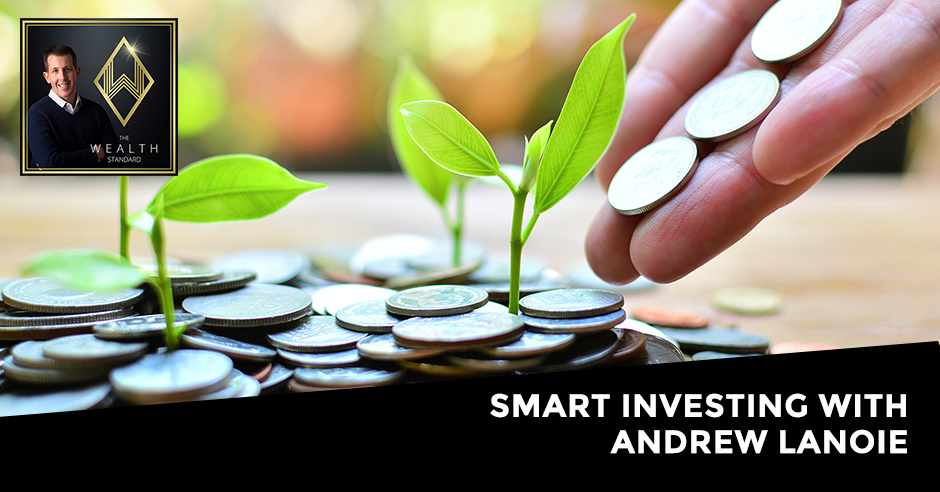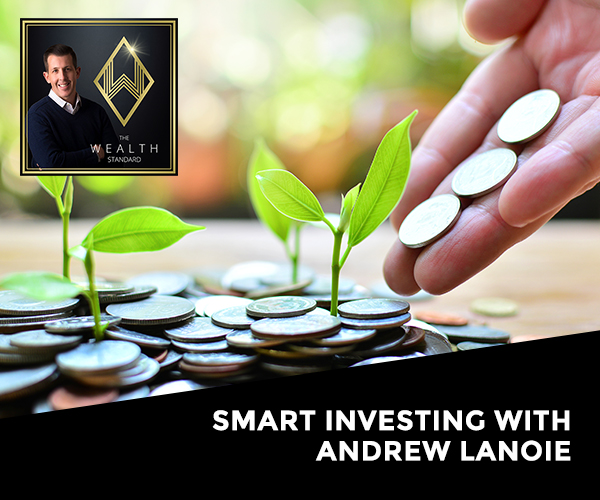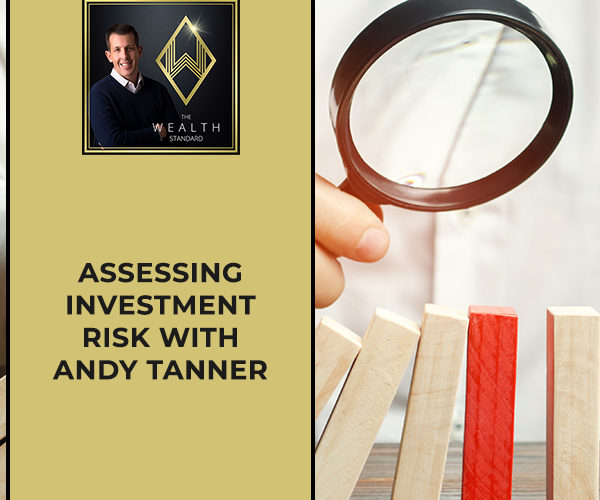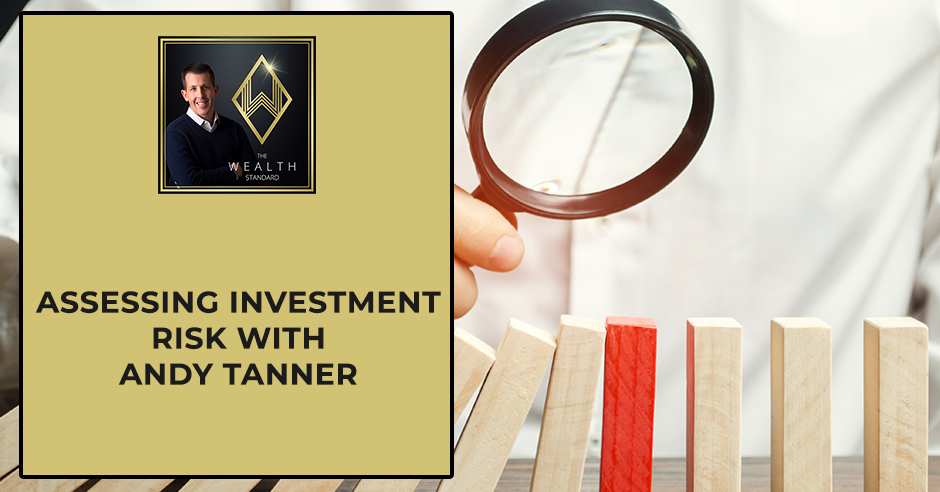Smart Investing With Andrew Lanoie
Podcast: Play in new window | Download

When it comes to investing, it’s important to be smart and informed. You got to differentiate between what you’re feeling or thinking and what the reality is, because education mitigates that emotion and allows you to make the best decision possible with the money you have saved. On today’s show, Patrick Donohoe chats with Andrew Lanoie, a full-time investor specializing in the past seven years in the affordable housing investment sector. Andrew is a smart investor and somebody you should follow and learn from. Don’t miss this episode to learn more about how you can achieve financial independence by investing in real estate.
—
Watch the episode here:
Listen to the podcast here:
Smart Investing With Andrew Lanoie
We are going to be talking about real estate again but investment in general. I have a good buddy of mine that I’ve known for a long time, Andrew Lanoie. He is one of the Managing Partners at Four Peaks Capital Partners. They specialize in a specific niche of real estate. He started a new podcast and I want to get him on the show to share that with you. I’ve been getting a lot of questions and inquiries in regards to what’s going on in the investment world, in general, especially in real estate.
A few episodes back, we talked about the investor behavior curve. It’s typically driven by emotion and what to look for there. I’ve heard stories of a lot of speculation, where uninformed, uneducated individuals are going about investing, whether it’s using the simple to use platforms like Ameritrade or Robinhood. They’re making uninformed trades and investments, and my concern is that that’s happening in the real estate market as well. It is an interesting time not to say that there aren’t deals out there because there are always deals. You’ve got to differentiate between what you’re feeling, what you’re thinking, and then what the reality is.
It is the perfect time to get second and third opinions and find other perspectives that may be more informed than yours. Whether it’s some of the stories around oil went to nothing and everyone wants to get into buying oil at the dip but yet, they go on. They find an ETF that sounds like it’s oil, but it’s an oil company who doesn’t benefit from the old price as being that low and ultimately going bankrupt or it’s people trying to get into a FAANG Index, Facebook, Apple, Amazon, Netflix and Google or Alphabet. It is the top tech stocks. They ended up buying the ETF, which is not the bank stocks, and ultimately buying on margin and getting crushed there.
These are the times where you have a lot of emotion driving decisions. Education is what mitigates that emotion and allows you to make the best decision possible with the money that you have saved. There being opportunities at the same time, I see high emotion. When there’s high emotion, it doesn’t always equate to the best investment, unless it is fear-based emotion. I don’t think we’re there yet. It’s time to be smart and be informed. I think Andrew is informed. He’s been a smart investment for years and I believe he’s somebody you should follow and learn from. Without further delay, I’m going to get to my interview with Andrew.
—
I’m joined by my good friend, Andrew. It is awesome to see you. You have been in the show before, but it’s been a while.
I’m always pumped to be here though.
Andrew is the Cofounder and Managing Partner at Four Peaks Capital Partners. He’s been in the real estate game for years. Andrew, you’ve given your background before, but why don’t you talk about your background, both previous to your real estate investing profession and what you have been doing.
I’m in Phoenix. I’ve been here for a few years. Prior to that, I was in Los Angeles for many years and I was in entertainment. If anyone’s seen the show, Entourage in HBO, I worked for the William Morris agency, which that show was based-off of and represented comedians and celebrities. I was at the company for about sixteen years. Sometime right after the subprime crash happened, my parents, my mom was a retired nurse and my dad was a retired plumber. Their retirement got crushed in the downturn in the subprime crash and here I am, making six figures at a huge talent agency, but all of my money tied up in the market. That was my big a-ha moment of, “How does that happen?” They raised three kids, lower middle class, followed the advice of their financial advisor and it didn’t work out during the subprime crash. I started reading a lot of books on economics and it all led to real estate and started investing in single-families. It was 2009, looking back on it, it was a good time to get into the market as far as pricing goes. In 2009 was when I started this whole real estate journey.

Smart Investing: Real estate is so macro, and there are many niches within it. Affordable housing specifically is a great place to be.
That was good timing. It’s one of those things like your portfolio and the markets, you crash the bottom, but you get into one of the better asset classes. The market’s rebounded. This is a side note before we get into our topic. When you look and understand that most habit if the market goes down by 20%, the Dow, S&P, and NASDAQ goes down by 20%. If it goes up by 20%, you don’t go back to even. If I give you $100,000, you lose 20%. Now you have $80,000 and you gain 20% of the $80,000, not the full $100,000. It’s interesting to see how people are like, “That’s simple math, but I’ve never put that together before.” When most people are super afraid of any type of investment, it usually always works out. I think you got in at that time, which hats off to you, where most people were like, “That’s all different investments.”
Looking at it through a different lens, it’s hard to wake up every day when you’re heavily invested in the stock market and you see all the swings and it feels volatile. I have many people that I talk to that were tired of it, especially when the market’s down. That clearly happens quite a bit. For me, it was all about income. It wasn’t looking at, “I want to put money into something and try to double it in a period of X amount of time.” I’m looking for things that generate cashflow. We all know that gets harder and harder now, especially where we are in this market. Back then, it was easier to find assets that you purchased. It was all about passive income. I didn’t care if the $100,000 property I bought went to $200,000 in X amount of time. It was like, “What’s my annualized return on that?” It’s good to be looking at through a different lens.
The values of real estate went down, but because of people getting foreclosed on not having a place to live, they had to rent something. In essence, it pushes rents up. Another celebration is that you launched a new podcast, The Impatient Investor, which I’d love to talk to you about. Also your partner, Michael Ayala has a podcast as well, Investing For Freedom where you talk about your story, what you’re seeing, and opportunities that exist, which we’re going to get into. Talk about what is the mission of The Impatient Investor and Investing For Freedom, which you are all part of?
The Impatient Investor has something that’s been in the back of my mind for years. I told this story before, but it’s an eye-opening moment for me to watch my parents’ retirement get devastated. Even further to that, my dad’s dad grew up, got married, had three kids, owned a home and car, put everyone through school, lower middle class, and all on one salary. That’s completely out the window. The theme of The Impatient Investor is the American dream is dead. What worked for my grandfather does not work for modern times. It’s all about having multiple streams of income and being able to do what you want. That’s the theme behind this.
We’re going to get into one of the main questions I get around real estate, which is, “How do you achieve financial independence by investing in real estate?” That question is interesting because there’s an implied answer that a person wants when they ask that. When you hear that question, how do you first characterize independence? You mentioned it with what you said in regards to the American dream, which I agree with.
Independence means different things for different people. For me, I didn’t want to be tied down to W-2 jobs in Corporate America and the whole golden handcuffs. When you’ve worked in Corporate America and even as great as that job could have been. My gig was good, but it’s Corporate America. There is a lot of backstabbing. I think independence means a lot of different things to different people. For example, some people want to create passive income where they’re not working for that money. It’s their money working for those returns. That gives them another ten hours a week to spend with their family or time to go on a 3-day, 4-day, or 5-day long weekend. It’s different things, but it’s freeing up that time because, at the end of the day, it’s all about time.
Time is the only finite commodity. You can argue that, but you look at what humanity has done for hundreds of years. It’s figured out ways to get more time. We don’t need to go down that tangent, but it’s the same thing. There are meaningful things that people want in life, even though we live a lifestyle and work at 9:00 to 5:00, it’s unlike any in history. At the same time, people are always wanting more. They want to grow. We’re driven for innovation and that’s where I wanted to get into real estate. Real estate is one of those asset classes. It’s broad.
There are many micro opportunities within that macro asset class. Sometimes it’s confusing. When you speak of real estate, there are a lot of things that probably come to mind for people. Talk about the different ways to invest in real estate and then segue into the passive income, the real estate that allows someone to experience more time and freedom. There’s real estate that does not give you more time and not give you more freedom.
The first thing is figuring out, “Are you looking for another job?” If you are and you want to go out to flip houses and be an active real estate investor, which means, “I’m going to go out. I’m going to build a team. I’m going to buy whatever asset class. I’m going to manage it.” There are a lot of variations within that. That’s great and maybe there are some higher returns on the backside. There are also a lot of risks, especially if you haven’t done it before, but going back to what you said, it’s also adding another job. A lot of the people that I talked to who are in my circle, they’re not looking for more work. They’re not looking for more jobs. They’re looking to put money to work. On the active side, certainly, there are opportunities there across the board, depending on where we are in the market cycle.
More on the passive side, it’s figuring out, “Are you looking for something that’s an income-based model? Are you looking for something with growth? Are you into something that’s more of speculation?” We are in the middle of Coronavirus or COVID and no real estate is the same. Right now, I wouldn’t want to be an owner or operator of office buildings. You had a portfolio of office buildings and they were at 81% occupancy and literally in probably a week, it goes to 5% or 0% or 9%. The same thing with retail. Real estate is so macro and there are many niches within it. It’s interesting to figure out what’s going to look at in the long-term. I’ve been in residential real estate my entire real estate career, which is always going to weather a lot of storms, depending on what part of that sector you’re in. Affordable housing specifically is a great place to be. It’s figuring out, “Do I want another job? Am I looking for something more passive where I do all the due diligence on the front end and then figure out how to put your money to work?”
Independence means different things for different people. At the end of the day, it’s about freeing up that time. Share on XThese are good points and you brought up some inherent risks that are in all real estate, but at the same time, there are certain questions you can ask and put your crystal ball cap on looking into the future. Sometimes you can see it or you can’t. Look at retail, how many people put it everything under retail? Amazon comes around and disrupts it in the office. Few people could have seen what was going to happen. We’re still shut down. It’s become the psychology of business where you don’t have to hire somebody in your local area. There are opportunities and they’re going to exist around the country. Who knows what that’s going to do because office leases are typically 5 to 10 years? It may have to play out over a period of time, but things are shifting because of how people are invading, also Black Swan events.
You had said something interesting from a residential standpoint. Residential still has multiple niches, but from a residential standpoint, people need a place to live. That’s never going to change. Talk about those different micro sectors of the residential investment world. We can unpack some of the opportunities and perhaps some things to look at in the future because I think things are in the midst of changing.
The first thing to look at is 50% of wage earners in the country make less than $31,000 a year. What’s interesting is a lot of those people are essential workers. If you think about what someone at Costco is making or Amazon fulfillment, gas stations, whoever’s left at restaurants, all the essential workers are out there. A lot of those people fit that profile. You’ve got 50% of people. Let’s say you make $30,000 a year and you take home $24,000. What does that get you for a housing allowance? The last median mortgage numbers I saw was somewhere around $1,200 a month.
You can’t afford $1,200 a month. Probably, you don’t have the FICO to qualify for that. Further to that, Chase announced that on a single-family home loan that their minimums are now no less than 20%. Their FICO went up to what you needed to qualify. How does that affect the housing market? It means there are more people that need to be renting because 30 days ago they were able to qualify for a mortgage. Let’s go back to the 50% of wage earners making $31,000 or less. Generally, they don’t have the FICO to buy a single-family house. They don’t have the down payment for a single-family house. It goes really to that segment. Most Americans, 1 in 3 have less than $5,000 in savings. Some have no retirement whatsoever. There are long-term demographic shifts towards lower-income housing. They talk about the middle class is shrinking. Does that mean that the upper class or the richer are growing? It is not. Certainly, to a degree but the lower-income people, that niche is getting bigger.
Innovation is doing more with less or doing the same thing with less. You start to look at labor. It is expensive. I’ll be frank, when my team went home and I started working there, I don’t have a food allowance. I don’t have parking. I saved quite a bit of money. There are lots of different expenses, whether the FICO that we pay, Social Security, Medicare, health insurance benefits, and there are other benefits. These eat into the business. When businesses are not receiving as much revenue as they had before, they’re looking for ways in which they can innovate. That’s where I would say, the longer you’ve been in a profession or a specific career, the more of a habit it’s become, and the less likely you’ve been to innovate. By not being able to innovate, it puts you out of the money that you were used to receiving. That’s why it’s vital for that. Half of the country is living at that level, but still, they need a place to live. They need a place to work. They’re going to go seek those places. How do you describe maybe the different types of affordable housing that are out there?
There are a couple of types. You’ve got multifamily. I saw an article and it said, “Even with mortgage assistance, 47% of homeowners are considering selling their homes due to the pandemic.” There are many trends that we’re seeing that are pushing towards America becoming more of a rental market. That’s not a new trend, but the circumstances that we’re seeing are all pointing towards that. As far as different kinds of affordable housing, we’ve been in the manufactured housing space for a while. That’s one of them. Maybe it’s C or D-class apartment buildings. The other thing that’s interesting with all of COVID-19 is if you’re not a candidate to buy a home and you’re going to live somewhere, do you want to move into a big apartment complex? Maybe not. If that’s within your budget, I don’t know. We’re having this new resurgence of cases. I’m here in Arizona and all of a sudden, there are more cases and they’re starting to shut things down again.
I don’t know if I would want to live in a big apartment complex, so that’s one of them. Manufactured housing is another one. In some markets, there are still single-family houses that you can pick up for $40,000, $50,000, or $60,000 maybe less. I would qualify that as affordable housing if you can afford it $800, $900, or $1,000 monthly home allowance. I was thinking about tiny homes, but those are people downsizing by choice. It’s a lifestyle choice. Those are $40,000, $50,000, $60,000 or $70,000 too. It is more of a lifestyle, but those are the big ones.

Smart Investing: If your core mission in real estate is residential, until there isn’t a demand for affordable housing or housing in general, figure out what your comfort is on certain niches.
Let’s go in that direction, the idea of a crystal ball, you look at the wealth gap and it is broadening. You also have a young generation and it has pushed up prices of apartments. It’s also caused some physical shifts from East Coast areas to Southeast areas, from West Coast to parts of the Midwest, Texas. They also have a different lifestyle. The younger generation has a different lifestyle. Given COVID, you have a demand and able to accommodate people that work from home, but also you do have those fears associated with living in a denser environment where you have neighbors that are a few feet away. You see those trends, and what’s hit with COVID and what things we’ll do in the future. It’s interesting to look at what the Baby Boomers are going to be doing. It’s good to look at what the Y Generation and Millennials do. Also from a wealth gap perspective, a lower-income housing, it’s going to be interesting to see those trends as well. Where do you see things seeing shaking out? I think we’re still in the middle of it, but what are you trying to keep a pulse on?
It was interesting to think about and looking at the US as a whole and you’ve got these major markets. You’ve got Los Angeles, DC, New York, and all these very densely populated areas, certainly New York City at the top of that list. They were the leader in all of this COVID-19 at the beginning for a while. You would see all of these small, secondary, and tertiary markets around the US, and some of them are flat or maybe in decline. You’ve had many companies that are outsourcing to the outside of the US. A lot of its jobs. We all saw what happened in Dallas, Texas the past years. Why were companies moving out of California and in other areas? They weren’t business-friendly. They weren’t playing ball with these companies, so the companies said, “Why am I going to pay this extraordinary amount of taxes to be here when you treated poorly? Why did Dallas explode the past years?” It was the job.
If you are here in North Dakota and you can’t find work, Dallas, Texas had affordable housing back then, but it’s more expensive nowadays. You’re going to move because you’re going to move to where the jobs are. It was interesting, do people cluster more around the big markets and Dallas becomes larger because there was land and they could build an expansion and all of that? That was a pretty interesting trend that was prior to this. I feel like it’s potentially going in the other direction, because do you want to live in New York City? Do you want to live in these big, massive apartment complexes? I’m sure we’ll see the other side of what’s happening with COVID and crossing our fingers that the destruction, we know it’s going to be massive, but hopefully isn’t going to completely destroy the economy. Only time will tell. It’s 1, 2, or 3 years from now. I feel like the trend of leaving some of these major markets, we’re going to see more of that. It will be interesting to see what the data shows on that.
We’re early in it and at the same time, you look at opportunities. I see things happening in a number of ways. At the same time, you’re not going to be able to tell. As you look at investment opportunities, these are where good due diligence questions come from. When you are presented with an opportunity, you’re able to ask questions about, “Where’s the demand coming from? How much is it there? What is the quality of that demand?” What came to mind when you were talking is the supply chain. I don’t think people realize how disrupted it’s been.
There’s going to be more of manufacturing in the United States because there’s more control and there’s less disruption. The manufacturing cities, I wouldn’t be surprised if there’s more demand there for better housing. Looking at where trends are going and trying to make bets, make investments, you’re able to mitigate risk by understanding what’s coming in the future. As we get into what your specific businesses, talk about what you have seen for the past years, as far as real estate investment trends, whether that’s a single-family, apartments, and what have you seen as some successes and some failures?
Overall, we always go back to until there’s not a need for affordable housing, it’s always going to be a viable option out there. It is hard to tell if you’ve got someone who’s building A-class luxury houses. There’s certainly a niche for that, but what happens during a downturn? The first thing that happens is talking as a business owner and other business owners are. You’re looking at your expenses. You’re figuring out, “How do we batten down the hatches?” We’re looking at these numbers and as of now, there are 4 million jobless claims. That’s incredible. Does that get the 50 million? Does that mean six months from now that there’s half of those still out of work?
Does that continue to affect retail? Does that continue to affect office space? My guess is it will affect residential real estate. I would assume, depending on how bad this gets. If your core mission in real estate is residential, until there isn’t a demand for affordable housing or housing in general, it’s figuring out what your comfort is on certain niches. Back to what you were saying, you would never have thought the office space building market would be devastated in days. Retail, you could see the Best Buy and these massive buildings that are whatever square footage. There are only many tenants and I can go into that. Your niche as an owner, being able to rent that out is small.
We’re bullish on affordable housing, but residential real estate in general for the long-term is going to be safe. You made an interesting comment when the stock market and all of the swings. If you own a piece of real estate and you’re in a correction, you may lose value in that home. You may have a home that’s $150,000 and now it’s worth $98,000. Did the rents decrease? The answer across the board is not really. Rents have always trended up for the most part. It doesn’t mean you can pick a market and say, “The rents were lower here in this year,” but overall they have always increased.
Residential real estate, specifically affordable housing, is always going to be needed. Share on XIt goes back to the story with my grandfather. People are sitting scratching their heads and saying, “Why is it that we have four jobs in this household and we can barely make ends meet?” The reason is that expenses are through the roof and salaries are not keeping up with that. That goes back to the American dream is dead. That worked 30 or 40 years ago to have one salary and live up a pretty nice life. Weren’t wealthy necessarily, but you paid the bills and put the kids through school, but that’s out the window. That’s scary. If that’s the trend, what does this look like in 50 years or a hundred years? I don’t have the answers, but you can look at the data and you look at where the trends are going.
You made some interesting observations, which is a question that we got, which is where the primary difference is between real estate investment and other types of investment. You hit on something first and foremost, where supply and demand oftentimes, as well as access to financing, are big factors when determining the value of a real estate. In supply and demand, if there is more demand, the prices go up. Demand these days is contingent on how easy financing is to get. At the same time, you have rental income. People need a place to live in. That is one of their first bills, their housing and their food. That right there secures residential in an area which is unlike other investments because you have two things going on, the income side of things and the value side of things.
Also with real estate, tax is different if you own the real estate. From an investment standpoint, there’s different taxation. From a real estate standpoint, there’s different taxation. With real estate, it’s much more favorable. If you looked at it, prices are going up. We’re in a monetary system that requires debt. The debt was increasing the money supply and it’s because the monetary policy wants growth, they need growth. Their target inflation is positive all the time. They don’t want deflation because it means they’re not going to have enough money to pay interest on the debt that they’ve been racking up.
You also look at their incentive to keep pushing more money into the system, and the value of your property is going to go up. At the same time, if you’ve used financing or leverage to acquire the property, the value of that debt goes down as inflation sets in plus rents typically will rise with inflation. You have a lot of interesting pieces and characteristics of real estate that don’t necessarily exist in other investments and then focusing on a big slice of the demographic bell curve. It’s not to say that real estate from an affordable housing standpoint is without risk. There are a lot of factors that help you mitigate it.
Through all of this, where we sit, there are too many unknowns with jobless claims and everything else. Our good friend, Ken McElroy has been saying that they’re talking about 30%, 40%, or 50% mortgage failures over the next amount of time. The courts have been shut down through most of this time. You’ve got people that haven’t been paying rents on their office building that they own. The same thing with the people that are leasing out of this. I saw another headline that said that mortgage delinquencies surged by $1.6 million in April 2020. We’re so far behind on the date of what’s happening. Every single month, there’s new information that comes out. It’s complicated and complex, but I keep going back to if you have the option to invest in residential real estate and it makes sense, and you’re clear on your direction, “I have an income model and it’s a long-term.” You’re not trying to flip things, which is out the window these days. Residential real estate, specifically affordable housing is always going to be needed.
Let’s speak a little more about your business, specifically in this niche. When we first met, you focused on single-family homes. You learned about being able to form a business where you syndicated. You started to get other investors’ money together and you form a business around being able to take that money and allocate it to bigger projects to have bigger leverage. Maybe talk about what Four Peaks Capital Partners is like what you guys have been doing for the last several, several years. Also, what are some of your plans moving forward?
I think 2013 is when I stopped buying single-families and it was simple. They stopped penciling out because the market crashes in the subprime crash and everything within that time period, all of a sudden, real estate is on sale. We’re not in a real estate crash. We even don’t know what we’re at. Are we even in a recession? I don’t think so. It’s still a pandemic.
Without the fed, we would be in a depression, but they’ve printed so much money. That’s another one of the benefits. That’s papered over what the real issues are.
In 2013, I stopped buying single-families. It was looking at what the next opportunity was and took off a hard look at commercials, different kinds of residential and apartment buildings, and the whole thing. We stumbled across manufactured housing and looked at the metrics. Even back then, you can complicate this stuff so much, but the simplicity is its supply and demand. It goes back to 50% of the wage earners are making $31,000 a year. In this sector, the collections over the past 90 days have been fine. We don’t know where this is going to go but we’ve been okay through this as an owner and operator in the affordable housing space. I didn’t see a pandemic coming in 2020 but looking at the numbers in the supply and demand. Does manufacture housing pencil out and make sense? It certainly did. That’s been our focus. My partner and I got a big heart for our residents in providing safe and affordable housing for them. That’s been our business model for the past years and is most of the focus on what we’ve been doing.
The reason I got excited about what you were doing was probably back in 2011 or 2012, I was helping the son of a friend of mine who had some drug problems. He was getting his life back together and he had tons of debt that he was trying to figure out. I helped him with some debt consolidation stuff. I put a savings plan together, spending plan together, but he had been working for this group that essentially owned or manufactured home areas around the country. It was just a family. They didn’t necessarily syndicate, but they were extremely well-off and successful, not because they had them, but because they figured out the business.
That is something that I knew you had within your mind, as far as understanding the entertainment space when you were back in that industry, how you brought that experience, and Mike’s experience as well to form a business out of it, which is not just buying and renting. It’s establishing a community. It’s using systems and applying those systems to different areas of the country. You have been able to do that remarkably successful. Talk about maybe that element of things because it’s not just the ability to identify an opportunity where there are numbers that makes sense. Numbers measure something. When the measurement is a process, a system, or an activity without a business around that, those numbers aren’t realistic. Maybe talk about that element of the business that you guys have created.
Looking at this from more of a 20,000-foot view, there are three big parts of our business. One is our resonance, the other is investors and the third is our team. When we started out doing this, we were a virtual company. I was in California. We had people and assets all over the US. For what we were doing, it simply didn’t work. It was too hard to manage and cruise multiple markets and multiple states. One of the reasons I moved to Phoenix was to open the office here with Mike. Let’s talk about the residents. We’re going into these markets that potentially poorly managed assets and you can’t go in and say, “Rents are this, and they should be this. We’re going to raise the rents the first year and we’re going to pass back utilities.” Without our residents, we don’t have a business. You have to be thoughtful, mindful, and conservative about how you approach each market and how you increase rents.
The second part of this is our investors. Without our investors, we wouldn’t also have the business and then the team. The team is probably one of the most important parts of this because with the right team, you put a plan into place and you can execute that. We spent a lot of time building out a vertically integrated company where we didn’t have to outsource a lot of this. We could be thoughtful about we’ve got all of these projects that we’re working on. How do you build a team to manage these efficiently? That’s what we’ve spent years doing. It is amazing to move to Phoenix, put roots down here, and work on executing the plan.

Smart Investing: There are three big parts of a business – your resonance, your investors, and your team.
You’ve also had some incredible mentors too. Kenny mentored you based on his extensive experience that you have been involved with. Some mutual relationships that we have where you’re learning from those that have the experience, which is huge. There’s only so much attention span we have as well as readers. We could probably keep talking for the rest of eternity. Talk about ways in which somebody can learn about Four Peaks Capital Partners, you, and about Mike, what you are up to and check out the podcast. Start to talk about some of those resources.
Four Peaks Capital Partners is our main equity company. It’s FourPeaksPartners.com. The Impatient Investor, which is my new podcast, TheImpatientInvestor.com and that’s on all the major podcasting platforms. Mike has Investing For Freedom. Those are the big three things. Back to what you were saying about the mentors and everything. We were around a lot of smart, successful people. The common thread between a lot of those people is giving good information and good content. How can you help? It is an abundance mentality, which probably the reason that we have been friends for this long because we feel the same way. It’s about how do you help? How do you give content? There are a lot of different ways. That’s always been a big mantra with everything we do.
One of those areas where there’s been so much innovation, I’m speaking to real estate investment and how it’s evolved over the years, especially the capital formation, putting deals together and how to provide good returns safely to people. It’s fascinating because it’s gone so fast, yet the mentality most have in relation to making investments is still tied to what they’ve always been taught, 401(k)s mutual funds, ETFs, stock, bonds. If it’s not there, then there are other investments out there. There’s been this evolution. At the same time, the way in which people think about investments has been changing slower than the investment world has innovated.
I look at what you have done and put together. It’s something that I would check out if you are an investor. You have some capital. You have some interest in real estate. Maybe you have a real estate already. It’s not something you hand them on over to Andrew. It’s one of those things where Andrew has been doing tons of education. You have done tutorials, videos, and you’re putting together another website. That’s providing even more information so that investors can do due diligence, ask the right questions, and subsequently make the right decision. Andrew, talk about that website that you have been working on and what that’s all about.
Be around smart and successful people. The common thread between them is they give good information and content. Share on XIt goes back to what worked for your grandparents. It doesn’t work these days because the American dream is absolutely dead. The website is NewStreamsOfIncome.com. It’s talking about how to create a more passive income, especially in all of the crazy times that we’re living in.
Andrew, it’s been awesome. Thank you again for taking the time and sharing your wisdom. Go and visit Andrew’s website, TheImpatientInvestor.com, and FourPeaksCapitalPartners.com.
Thanks, Patrick for all the things that you do at Paradigm. There’s unbelievable content so you could spend a couple of years on your site.
That’s a good thing and a bad thing sometimes. Thank you again for the time. I appreciate it.
Thanks, Patrick.
—
I have a couple of other episodes coming up in the future. Make sure you go and get on the newsletter list so that we can send you updates when new episodes come out. Go to TheWealthStandard.com to subscribe. I hope you’re doing well, safe, and enjoying so far. I’ll talk to you next time.
Important Links:
- Four Peaks Capital Partners
- Andrew Lanoie – past episode
- Investing For Freedom
- FourPeaksPartners.com
- TheImpatientInvestor.com
- NewStreamsOfIncome.com
- www.ParkPlaceCommunities.com
About Andrew Lanoie
 Andrew Lanoie is an expert at building teams and connecting people with opportunities. Formerly a Talent Agent at William Morris for 16 years, he represented some of America’s biggest celebrities – from Sheryl Crow to Barry Manilow to Peter Frampton to Lily Tomlin. In 2009, Andrew began investing in single-family residences. He left the agency to focus on investing full-time, specializing for the past 7 years in the affordable housing investment sector. Andrew and his partners have acquired tens of millions of dollars of income-producing real estate in some of the best-performing markets in the country. Andrew is skilled in out-of-state investing strategies, creating operating systems, and investor relations.
Andrew Lanoie is an expert at building teams and connecting people with opportunities. Formerly a Talent Agent at William Morris for 16 years, he represented some of America’s biggest celebrities – from Sheryl Crow to Barry Manilow to Peter Frampton to Lily Tomlin. In 2009, Andrew began investing in single-family residences. He left the agency to focus on investing full-time, specializing for the past 7 years in the affordable housing investment sector. Andrew and his partners have acquired tens of millions of dollars of income-producing real estate in some of the best-performing markets in the country. Andrew is skilled in out-of-state investing strategies, creating operating systems, and investor relations.
Love the show? Subscribe, rate, review, and share!








 Andy Tanner is a renowned paper assets expert and successful business owner and investor known for his ability to teach key techniques for stock options investing. In 2008, Andy was key in helping develop and launch Rich Dad’s Stock Success System, which teaches investors advanced technical trading techniques to profit from bull and bear markets.
Andy Tanner is a renowned paper assets expert and successful business owner and investor known for his ability to teach key techniques for stock options investing. In 2008, Andy was key in helping develop and launch Rich Dad’s Stock Success System, which teaches investors advanced technical trading techniques to profit from bull and bear markets.













